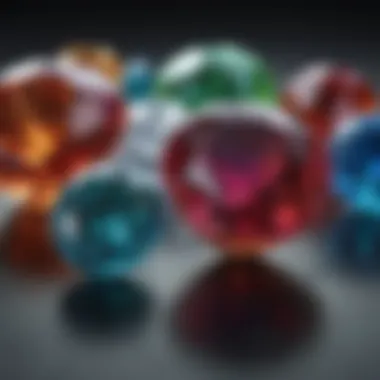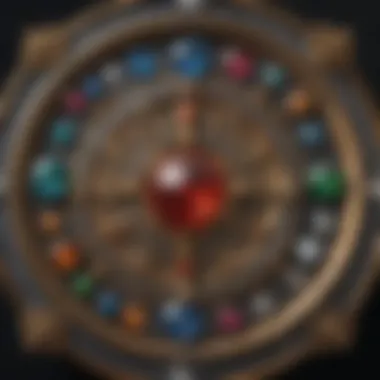Understanding Your Birthstone: A Comprehensive Guide


Intro
Birthstones are more than just gemstones; they embody personal significance and cultural heritage. This article embarks on a journey to comprehensively understand the world of birthstones. By exploring their meanings, origins, and astrological relevance, the aim is to provide readers with a nuanced understanding of these precious stones. This guide is tailored for those intrigued by astrology and personal insight, aiming to furnish valuable knowledge about the connections between stones and the celestial entities that govern human experiences.
Understanding the Zodiac
Overview of Zodiac Signs
The Zodiac, with its twelve distinct signs, plays a pivotal role in astrology. Each sign corresponds to specific timeframes within the year. These signs include Aries, Taurus, Gemini, and so forth. Each sign holds unique characteristics that influence personality traits and behaviors.
Sign Traits and Characteristics
Every zodiac sign encapsulates a set of traits that can help identify personality aspects among individuals. For example:
- Aries (March 21 - April 19): Bold and ambitious.
- Taurus (April 20 - May 20): Reliable and patient.
- Gemini (May 21 - June 20): Adaptable and outgoing.
- Cancer (June 21 - July 22): Intuitive and emotional.
These traits are essential for understanding how one's sign correlates with their birthstone.
Elemental Qualities
Additionally, each zodiac sign is affiliated with one of the four elemental qualities: fire, earth, air, and water. For instance:
- Fire: Aries, Leo, Sagittarius - known for their energetic and passionate nature.
- Earth: Taurus, Virgo, Capricorn - grounded and pragmatic.
- Air: Gemini, Libra, Aquarius - intellectual and social.
- Water: Cancer, Scorpio, Pisces - sensitive and intuitive.
These elemental connections further enhance the resonance of birthstones within astrological practices.
Astrological Insights
Current Astrological Trends
As astrology evolves, new trends emerge that impact the interpretation of birthstones. Understanding these trends can provide insights on how to align personal energies with planetary movements.
Influence of Celestial Events
Celestial events, such as planetary retrogrades or alignments, can profoundly influence personal energies. For example, during a Mercury retrograde, one may feel challenges in communication. Knowing how these events interact with one's birthstone can offer valuable guidance.
How to Interpret Your Birth Chart
A birth chart serves as a personal blueprint, detailing the positions of celestial bodies at one's birth. By examining the influences of the Sun, Moon, and rising signs, one can gain insights into how their birthstone complements their astrological profile.
Horoscope and Predictions
Monthly or Weekly Forecasts
Horoscopes offer forecasted insights based on astrological placements. Such predictions can help individuals understand how their birthstones may play a role in the upcoming months.
Personalized Horoscope Reading
Personalized readings provide deeper insights tailored to individual needs. By integrating the unique properties of a birthstone, one can gain clarity in personal and professional areas of their life.
Compatibility Readings based on Zodiac signs
Understanding compatibility among zodiac signs can enhance interpersonal relationships. Birthstones often complement certain signs better, thereby enriching personal connections.
Each birthstone carries a unique energy that can amplify the traits of its corresponding zodiac sign.
Prelims to Birthstones
The concept of birthstones is not merely a fashionable trend but encompasses a rich tapestry of tradition, cultural significance, and personal meaning. Understanding birthstones allows individuals to appreciate their deeper connections to identity, heritage, and even astrological insights. This section delves into the definition and origin of birthstones, as well as their historical contexts, to provide a solid foundation for exploring how these gems influence individuals’ lives.
Definition and Origin of Birthstones
Birthstones refer to specific gemstones that are assigned to each month of the year. These stones are believed to possess distinct properties relevant to people born in that month. The tradition of associating certain stones with months dates back thousands of years. Historical texts show that ancient civilizations, such as the Babylonians, identified gemstones with the zodiac signs and linked them to spiritual meanings.
The modern list of birthstones was standardized in 1912 by the American National Retail Jewelers Association. This list was influenced by various factors, including historical precedents and the perceived attributes of each stone. Consequently, the use of birthstones has evolved into a means of celebrating one’s birth month, often manifested in jewelry or personal items. Acknowledging this association invites a more profound connection to one’s personal gem.


The Historical Context of Birthstones
The historical development of birthstones is multifaceted. In ancient cultures, gems were believed to hold magical properties and were often used in talismans or protective amulets. The biblical Book of Exodus describes the Breastplate of Aaron, which featured twelve stones representing the twelve tribes of Israel, akin to the twelve zodiac signs. Each stone had specific astrological significance, establishing an early link between gemstones and celestial influence.
Throughout history, various cultures have adopted unique interpretations of birthstones. For instance, in Ancient Rome, people believed that wearing a gemstone corresponding to one’s birth month would bring good fortune and ward off negative energies. In more contemporary times, the notion of giving birthstone jewelry as gifts remains popular, symbolizing love and connection. This enduring relevance highlights the stones not just as adornments but as carriers of history and myth, bridging the past with the present.
"Birthstones are more than gemstones; they are a connection to history, identity, and the cosmos."
Understanding the background and significance of birthstones enriches their value, elevating them beyond mere aesthetics. As we continue to explore the specific birthstones assigned to each month, we will uncover their unique attributes and the cultural interpretations that inform their meanings.
The Twelve Birthstones
Understanding the twelve birthstones is essential in grasping the broader context of birthstones. Each stone not only represents a specific month of the year but also embodies unique meanings and attributes. This section aims to highlight the significance of these gems, examining how they influence personal characteristics, astrological insights, and their cultural relevance.
These stones offer more than decorative appeal. Many people believe that each stone can exude certain energies, serving to guide the wearer's emotional and spiritual journey. Knowing your birthstone can enhance your connection to these energies, making it a powerful aspect of personal identity and self-discovery.
January: Garnet
Garnet, the birthstone of January, is often associated with loyalty and enduring love. This robust stone comes in various colors, with deep red being the most common. Historically, garnets have been used in jewelry since ancient times, treasured by civilizations for their perceived protective properties and ability to inspire creativity and passion.
People born in January often resonate with the qualities of garnet, such as determination and strength. Incorporating garnet into personal adornments can signify a commitment to one's ambitions and relationships.
February: Amethyst
Amethyst is a striking purple stone, recognized as the birthstone for February. It is admired for its stunning aesthetic, as well as its reputed calming effects. Often seen as a stone of wisdom, amethyst is linked to clarity in thought and emotional balance.
For February-born individuals, amethyst symbolizes sincerity and tranquility. It can be a valuable asset in meditation practices, enhancing focus and spiritual growth.
March: Aquamarine
The soothing blue hue of aquamarine makes it the birthstone for March. This gem is associated with serenity and clarity, reflecting the qualities of the sea. Aquamarine is often believed to promote courage and dispel fears.
Those born in March may find that aquamarine encourages a sense of peace and enhances communication skills, making it a beneficial gemstone for personal expression.
April: Diamond
Diamonds, celebrated as April's birthstone, symbolize strength and invincibility. Known primarily as a luxury stone, their clarity and brilliance often represent purity and eternal love. Diamonds have held a prominent place in human culture, most famously in engagement rings.
For those born in April, wearing diamonds can lead to increased self-confidence and empowerment, acting as a reminder of one's resilience.
May: Emerald
Emerald, the birthstone of May, is cherished for its vibrant green shade, which signifies rebirth and fertility. Associated with prosperity and abundance, emeralds are linked to growth and harmony in relationships.
Individuals with a May birthday may draw strength and enhanced intuition from emerald, making it pivotal for those seeking emotional balance and constructive insights.
June: Alexandrite
Alexandrite, the birthstone for June, exhibits a unique color-changing property, demonstrating hues between green and red. This gem symbolizes adaptability and transformation. Historically, it has been associated with fortune and insight.
For those born in June, alexandrite can signify the potential for change and personal growth. It may cultivate a deeper understanding of oneself and one’s life path.
July: Ruby
Ruby, with its deep red color, represents July. This gemstone is often viewed as a symbol of passion and vitality. It has a long-standing reputation for stimulating energy and enhancing life force.
Those born in July often find themselves connected to the attributes of ruby, such as leadership and confidence. Wearing ruby can signify ambition and a zest for life.
August: Peridot
Peridot is the birthstone for August, characterized by its light green color. It is linked with vitality and renewal, symbolizing growth and development. Peridot is known to promote healing and balance in personal relationships.
Individuals born in August may resonate with the stone’s refreshing energy, using it as a tool for attracting love and improving overall well-being.
September: Sapphire


Sapphire, the birthstone of September, is revered for its deep blue color and association with wisdom and royalty. It has been valued throughout history for its ability to promote mental clarity and spiritual insight.
For September-born individuals, sapphire can be a means to strengthen inner truth and intuition, guiding them toward their goals with determination.
October: Opal
Opal, recognized as the birthstone for October, is celebrated for its unique color spectrum. It embodies creativity and inspiration, often linked with imagination and artistic expression.
Those with October birthdays may harness the vibrant energies of opal, using it as a source of motivation in their creative pursuits.
November: Topaz
Topaz is the birthstone for November, known for its yellow and golden hues. This stone is often associated with strength and intelligence, symbolizing clarity of thought and purpose. Topaz has long been linked to joy and abundance.
Individuals born in November may utilize topaz for mental enhancement, seeking to achieve personal aspirations and emotional resilience.
December: Turquoise
Turquoise, the birthstone for December, is appreciated for its captivating blue-green color. It symbolizes protection and peace. Turquoise is held in high regard across many cultures for its believed healing properties.
For those born in December, wearing turquoise might engender a sense of safety and emotional grounding. It can also enhance creativity and self-confidence.
How to Discover Your Birthstone
Knowing your birthstone can be a fascinating journey, providing insights into not only your birth month but also your personality and potential. Birthstones are more than mere gemstones; they carry cultural significance and personal symbolism. Understanding how to discover your birthstone is crucial for anyone interested in astrology or those simply drawn to their unique properties. This section will explore three main avenues: determining birthstones by month, examining cultural variations, and using astrology. Each path offers a distinct perspective on the significance of these stones.
Determining Birthstone by Birth Month
The most straightforward method to discover your birthstone is to refer to the month of your birth. Each month is paired with a specific gem, traditionally associated with various traits and powers. For example, January is represented by Garnet, known for its energizing properties. This connection between your birth month and a specific gemstone gives a foundational aspect to how you may identify with that stone.
Here’s a list of the birthstones by month:
- January: Garnet
- February: Amethyst
- March: Aquamarine
- April: Diamond
- May: Emerald
- June: Alexandrite
- July: Ruby
- August: Peridot
- September: Sapphire
- October: Opal
- November: Topaz
- December: Turquoise
This list serves as a quick reference. Each month’s auspicious stone is thought to resonate with specific qualities, such as clarity, wisdom, or protection. Thus, by identifying your birth month, you can begin to explore the unique characteristics associated with your birthstone.
Cultural Variations in Birthstones
Traditions regarding birthstones can vary significantly across cultures. In Western society, the modern list is largely based on the one established in 1912 by the American National Retail Jewelers Association. However, many cultures have their own systems and meanings.
For instance, in Vedic astrology, which is popular in India, the stones are selected based on your birth chart rather than mere birth month. Each stone is tied to the planet that governs your personality. This emphasizes a more astrological approach, reflecting a deep connection between celestial influences and one's characteristics.
It is also noted that in different countries, people might attribute various properties to the same stones. These cultural narratives can enrich personal understanding and appreciation of a birthstone.
"Understanding the cultural context of birthstones can enhance their significance and create a deeper personal connection."
Using Astrology to Find Your Birthstone
Astrological considerations can also lead to the identification of your ideal birthstone. Many seek to find their birthstone through the lens of their zodiac sign instead of their birth month. Each zodiac sign is ruled by specific planets, and there are stones linked to these celestial bodies.
For example, if you are a Taurus, you may feel a connection to Emerald, which is the traditional stone for this sign. People who engage with astrology often believe that these stones enhance certain traits or provide support during challenges unique to their zodiac sign.
Astrology offers various ways to explore the connections between stones and personality traits. It adds layers of meaning that can enrich the relationship you have with your birthstone.
In summary, discovering your birthstone can provide personal insights and connect you to a rich tapestry of cultural and astrological traditions. This quest not only involves recognizing the stone linked to your birth month but also exploring variations across cultures and astrological interpretations.
Significance of Birthstones
Understanding the significance of birthstones goes beyond mere decoration or aesthetics. These stones carry deep meanings that intertwine with personal identity, culture, and spirituality. For those interested in astrological practices, recognizing one's birthstone can provide insights into personality traits, strengths, and weaknesses. More importantly, birthstones are often seen as symbolizing protection, guidance, and healing.
In various cultures, birthstones are associated with specific months and are believed to influence the lives of those born during that time. The gems are not only valued for their physical beauty but also for their purported metaphysical properties. This connection elevates them from ordinary gemstones to items of personal power and significance.
Astrological Implications
Birthstones have a prominent place in astrology. Each stone aligns with astrological signs, which adds layers to their meanings. For example, Taurus is linked to emerald, representing prosperity and growth. People under the influence of this sign may find resonance in the characteristics attributed to emerald, leading to enhanced self-awareness and empowerment in their choices.


Individuals often wear or keep their birthstones close to harness the energies associated with their signs. Many astrologers recommend incorporating these stones into daily life to foster a deeper connection to their inherent qualities.
Healing and Metaphysical Properties
The belief in the healing properties of birthstones is pervasive across numerous cultures. Each stone is thought to possess unique energies that can facilitate emotional balance, mental clarity, and even physical healing. For instance, amethyst, associated with February, is said to promote calmness and is often used to alleviate anxiety and stress.
People use birthstones in various forms, such as jewelry or crystals, to invite these beneficial properties into their lives. Regular interaction with one's birthstone can be seen as a holistic approach to wellness, both psychologically and physically.
Cultural Beliefs and Practices
Around the world, different cultures have specific beliefs surrounding birthstones. In some traditions, these stones are used in rituals or are gifted during important life events like birthdays and weddings. The use of gemstones in such ways speaks to their emotional and cultural significance.
Moreover, some individuals may perform personal rituals with their birthstone, aimed at enhancing positive outcomes in life situations or spiritual connections. Each culture has its own set of customs, ranging from the types of stones used to how they are worn or displayed.
Understanding your birthstone can be a gateway to self-discovery, alignment with cosmic energies, and connection with cultural heritage.
The significance of birthstones is multifaceted, being deeply grounded in both personal and cultural frameworks. Recognizing how these stones relate to you can provide valuable insights, enhancing not only your understanding of astrological influences but also your individual journey toward self-fulfillment.
Contemporary Uses of Birthstones
The significance of birthstones extends beyond their origins and metaphysical properties. In modern society, these gemstones have woven themselves into the fabric of personal adornment and tradition. Understanding their contemporary uses provides insight not only into how individuals express their identity but also into their roles within various cultures. Birthstones serve as vital symbols of connection, representing personal milestones and emotional sentiments. This section will explore the current trends in jewelry and their meanings and how birthstones feature in gifting traditions.
Jewelry Trends and Personal Adornments
The jewelry industry has embraced birthstones, making them a popular choice for personal accessories. Today, individuals choose to wear their birthstones in various forms—rings, necklaces, bracelets, and earrings. These pieces are more than mere ornamentation; they are deeply personal. Many people view their birthstone jewelry as extensions of their identity, tying it to their astrological profile or personal beliefs.
Current trends show an inclination towards custom and bespoke pieces. Jewelry designers frequently offer personalized options where clients can select the stone, cut, and setting that reflect their style. This trend emphasizes individuality, as wearers often prefer designs that resonate with their personalities or significant life events. Moreover, birthstones are often combined with other materials like gold, silver, or even pearls, creating unique contrasts in texture and color.
Another emerging trend is the use of ethically sourced stones. Conscious consumerism has gained traction, and many individuals prioritize ethical considerations when purchasing their birthstone jewelry. This choice not only elevates the meaning of the piece but also reflects a commitment to sustainability.
Gift-Giving Traditions
Gift-giving is an important cultural practice, and birthstones have a significant place in this tradition. The act of gifting a birthstone carries considerable meaning, symbolizing thoughtfulness and consideration for the recipient's character and identity. For example, presenting someone with their birthstone can express love, respect, or deep friendship, cementing relationships through carefully chosen gems.
In many cultures, it is common to give birthstone jewelry during significant milestones, such as graduations, anniversaries, or birthdays. The act of gifting a personalized piece can strengthen emotional bonds and serve as lasting reminders of special moments. The significance of the birthstone enhances the emotional connection between the giver and receiver, making the gift more than a simple item—it becomes a cherished symbol tied to the recipient's identity.
Often, families pass down birthstone jewelry through generations. This practice underscores the continuity of traditions and emphasizes the stones’ roles as heirlooms. Such pieces tell a story, encapsulating family history and fostering a sense of belonging.
"Birthstone jewelry is not just a trend; it is a celebration of personal narratives, an intersection of identity, culture, and connection."
End
The contemporary uses of birthstones reveal their enduring appeal, merging aesthetics with meaning. As symbols of identity and cherished gifts, birthstones enrich personal lives and cultural traditions alike. Understanding these aspects allows individuals to appreciate the depth of significance that birthstones embody in today’s society.
Epilogue
The conclusion serves as a critical component in understanding the multifaceted significance of birthstones as explored in this article. It encapsulates key findings and articulates their relevance in our lives, particularly for individuals intrigued by astrology and metaphysical traditions.
Reflecting on personal experiences with birthstones can provide insights into their meaning. Many people find that their birthstone resonates with their character traits or personal journey. Such reflection can foster a deeper connection with these gems, transforming them from mere ornaments into symbols of identity and purpose.
Additionally, recognizing contemporary trends related to birthstones may present new opportunities for exploration. For instance, advancements in jewelry design have led to innovative ways of showcasing these stones. Their integration into modern jewelry trends illustrates a shift towards personalization and individual expression in adornment.
Birthstones are more than just gems; they are avenues for self-exploration and personal growth.
Personal Reflections on Birthstones
Personal reflections on birthstones provide an intimate lens through which individuals can explore their significance. Every person has a unique relationship with their birthstone, shaped by experiences, heritage, and cultural influences. For many, their birthstone symbolizes resilience, with the attributes of the stone mirroring aspects of their life journey.
Individuals often share stories about how their birthstone offers comfort during challenging times or serves as a reminder of personal achievements. This emotional connection can be profound. Birthstones can spark feelings of nostalgia or connection to familial traditions. For example, an amethyst might remind someone of a grandmother who cherished that stone, thus binding a generations-old bond.
Many also engage with their birthstones in a ceremonial or ritualistic context. For instance, some choose to wear their birthstone during significant life events, thus weaving it into the fabric of their experiences. These moments contribute to a personal narrative that enriches one’s understanding of the stone.
Future Trends in Birthstone Understanding
As awareness around holistic health and wellness grows, the future of birthstone understanding is likely to evolve. Increasing interest in astrology and crystals suggests a promising trend in how people will value their birthstones.
The integration of technology into gemstone analysis may also redefine personal engagements with birthstones. For example, mobile applications could allow users to track the properties of their stones or find meaningful ways to incorporate them into daily life. This level of engagement can foster a more profound appreciation and understanding of these stones.
Moreover, social media platforms like Facebook and Reddit are increasingly becoming avenues for sharing experiences related to birthstones. Community discussions can spark new ideas and interpretations, creating a collaborative understanding of these gems’ significance.
In summary, the future of birthstone understanding appears ripe with potential for personal insights and connections, making this field one worth exploring further.
By fostering personal connections and exploring future trends, enthusiasts can deepen their appreciation of birthstones and their role within astrology and individual identity.







